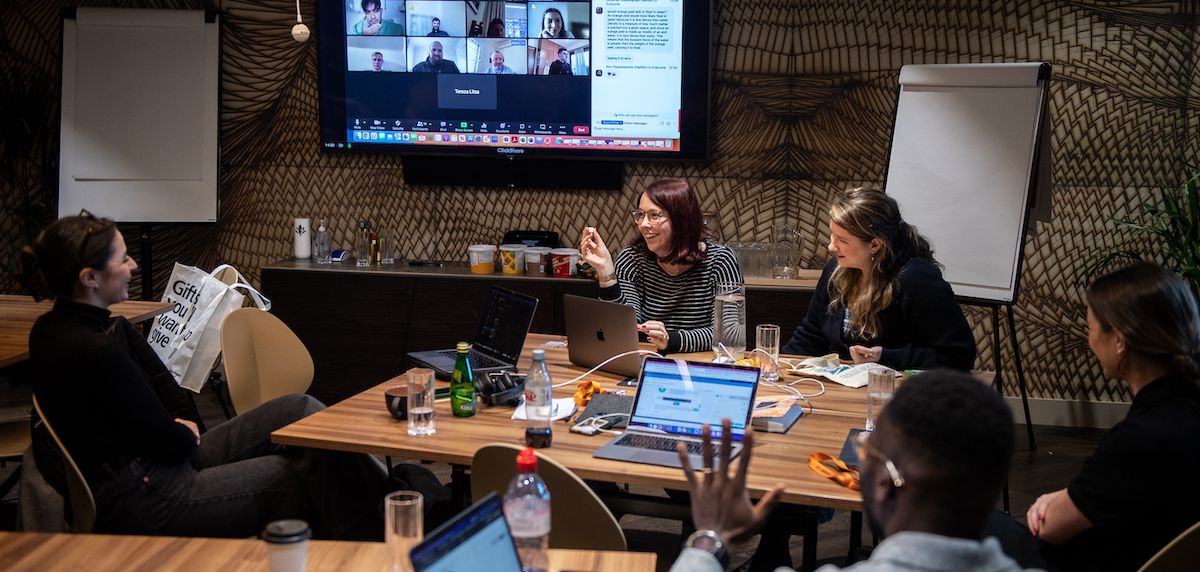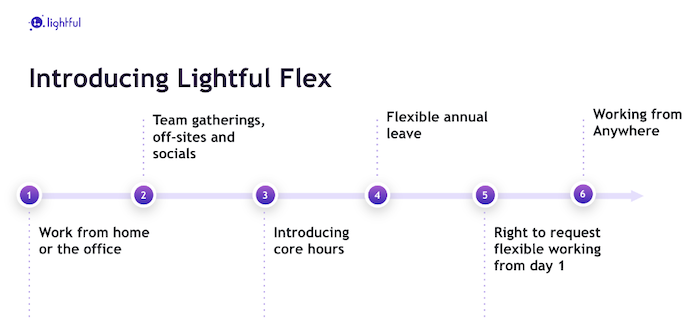Embracing flexible working for purpose-driven organisations

In the last couple of years, almost all employers have been debating where, when and how their teams should be working together. Like everyone, the Lightful team quickly adapted to the new normal that the pandemic thrust us into.
Now that the world has opened up again, it's important to reflect on the outcomes of remote working if we are to make it part of our ways of working. Does it allow for our people's wellbeing and productivity to stay central to how we operate? The overwhelming answer is clear: most definitely. In turn, this helps us as an organisation to maximise our impact. There's every reason why this should remain the basis for our new approach in this post-pandemic world as well.
Remote working not only allows us to be competitive as an employer but also retain the best talent in our team - if we don’t say so ourselves! This people-centric outlook has always been a driving force for our culture and we’ve now formally committed to this being essential to our ways of working due to our B Corp accreditation. We suspect that other purpose-driven organisations share many of the same goals as us. That’s why we wanted to share our approach, or ‘Lightful Flex’, as well as what we’ve learned in the hope that it’ll inspire others to empower their colleagues as well.
What we’ve learned from introducing Lightful Flex

1.Let your people decide if they prefer to work from home or the office
It’s not the most groundbreaking statement, but everyone leads different lives, meaning everyone has different needs. Likewise, your approach to where you ask your team to work from doesn’t need to be groundbreaking - let them decide! Giving your team the autonomy to manage their work-life balance rather than mandating daily/weekly attendance will undoubtedly increase their wellbeing. At Lightful, the pandemic really highlighted the differing personal priorities in the team. Some may be juggling childcare, others may prefer attending a lunchtime workout class, while some just cannot abide by a morning rush-hour commute. Remote working provides people with the flexibility that being located in an office may not. At times, some may relish the thought of separating their home and work lives and enjoy the escape to another location to spend their working days.
A key ingredient for your people to see your investment in their wellbeing is through embedding a culture of trust, especially when the whole team isn’t working under the same roof. When it comes to trusting people to get their work done wherever they are based, teams should try moving to an outcome, or results-driven, approach, rather than input-driven. Instead of meticulously checking the team’s timesheets to monitor the number of hours they’ve worked in a week, look at the quality of the work they’ve produced and whether it’s contributing to the overall efficiency of the company. If someone’s internal communication status such as Teams or Slack goes offline for a period of time, people shouldn’t panic and assume that their colleague has jumped into bed for a nap. Let your team refill the kettle, walk their dog before it gets dark, do something that enhances their wellbeing - screen breaks are healthy!
This being said, when people aren’t delivering, structures should already be in place in your teams whereby conversations around performance can be instigated between manager and direct report.
Top tips to set your team up for success both at home and in the office to provide them with what they need to work well:
- Try implementing a ‘Health and Safety assessment’. Each member of the team should go through the formal process of being sent the necessary kit they need to work safely and comfortably in their role. We’ve had a great experience using Red-Inc, a fellow B-Corp and sustainable office supply provider. Second hand kit is also a sustainable option too
- We recognise the added expense incurred from renting an office, especially for charities, for example, where budgets are often tight. There are ways to get creative with the where in this recommendation. As an example we purchased a handful of weekly day passes with Fora, but there are various other companies that can offer similar services that can help to keep costs low.
2.Explore opportunities to get the team together for social activities and collaboration
Remote working is great at times, but everyone is able to see the power of in-person collaboration. It leads to innovation, a shared understanding of mission/purpose and an increased sense of ownership.
At Lightful, we ask that people come together on a quarterly basis and we circulate an agenda ahead of time and where the focus is on collaboration, creativity and fun. This doesn’t mean that we don’t host other events, team updates, social activities, at other points in the year but these are not mandatory. Peppering these various events in our calendar means we still get to see each other regularly. This way we’re reminded of how important seeing each other is for driving our culture forward.
3.Be inclusive with the working schedule
To allow for people to truly balance their work and life commitments, experiment with core working hours. Agreeing and communicating core hours e.g. 10am - 4pm allows everyone to start or finish their day in a way that makes life outside of work more convenient. We have quite a few people who certainly don’t not classify themselves as ‘morning people’, meaning 10am-6.30pm suits their hours of productivity far better than 9am - 5.30pm. Others are early birds, and start earlier in the morning. Remember - hosting your team meetings within your core working hours shows your commitment to making them work across the team.
In always looking to create a more diverse, equitable and inclusive workplace, it seemed odd to force the whole team to take UK bank holidays off work. It feels antiquated to assume everyone wants to have Easter off work and insist people use their annual leave to celebrate Eid, Diwali, Rosh Hashanah and other holidays that are significant to them. Some may not observe these holidays or have their own public holidays from their home country. Others may simply prefer to have these days added onto their annual leave allowance to use at different times. From 2023, we’re trialling adding an extra 8 (or 9 as it is this year) days of annual leave to the team’s allowance for them to choose when they take a bank holiday as annual leave.
4.Set up a ‘work from anywhere’ policy
It’s worth asking whether everyone, especially those who are not client-facing, needs to be in the same office, town, country or even continent when working from their laptop? With this in mind, and also considering we’re a team of keen travellers, we circulated a ‘working from anywhere’ policy. This allows for our team to work from anywhere nationally but, more excitingly, abroad for up to three months in a financial year. Naturally, this is subject to a couple of very reasonable conversations around safety, data security and working hours with managers. Word to the wise - be careful when it comes to the issue of tax! It can be a little tricky as different countries have different rules, so if in doubt, err on the side of caution and seek some advice.
This policy has given the team the ability to extend their trips to see their family abroad and also reignited people’s desire to see the world and work from other, exciting places. If this scale of increased flexibility doesn't work for you, there are ways to be creative and implement something with a similar impact. A smaller time frame for people to work abroad in a year, perhaps?
Bonus tip!
- Communicate with your team! Check-in with them, conduct surveys, and ask them how they’re adapting to the ways of working of your company. We’ve found Culture Amp a really helpful tool to use. There may be ways you can improve your flexible working policy off the back of the findings from these conversations/surveys. You will never know without asking your team! Remember, the culture of a workplace is led by the people within it. The aim is to create a culture of feedback so you know what they think of your ways of working and how they may think it can be improved even further.
Whether you’re a big business or a small charity, it’s absolutely necessary to put people at the centre of how you operate. This is true of every conversation, especially when considering how to craft your ways of working. It’s only logical - people make up the team, and the culture, and work hard to maximise your impact as a whole company. Since launching our new approach, we were pleased to see 96% of the team favourably answering the question ‘We are genuinely supported if we choose to make use of flexible working arrangements’ in our recent engagement survey. This supports our hypothesis that thinking about your ways of working in a holistic way and seeing your people as trusted adults, rather than resources, will help to shape the culture you seek to create. Empowering your colleagues, enabling and supporting them to do their best work.
We hope this has been food for thought and perhaps your kickstart to being bold in conversations around how your team works. We’d love to hear how you’ve crafted your own people-centric ways of working

Great news! We have been shortlisted for the UK Company Culture Awards 2023 in the ‘Best Flexible Working Policy’ category! You can find the list of finalists here.
Latest articles

Over the past year, Lightful and the International Confederation of Midwives (ICM) have supported Midwives Associations across Africa, South Asia and the Eastern Mediterranean to build their digital confidence through our BRIDGE programme. These organisations were starting from very different places, but all shared the same goal: to use digital tools to strengthen their voice, raise their visibility and advocate for better outcomes for women and babies.
Related posts

Lightful has been selected for The Escape 100, a well-known campaign highlighting the top purpose-led organisations to ‘escape to’ in 2023!

The Lightful team shares their reflections and hopes this International Women’s Day (IWD).
See who we help
Contact us
Want to learn more?
Email Jonathan and start a conversation






